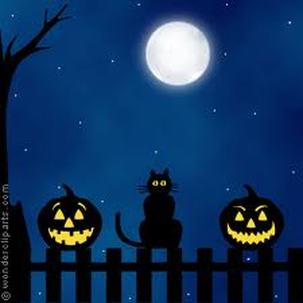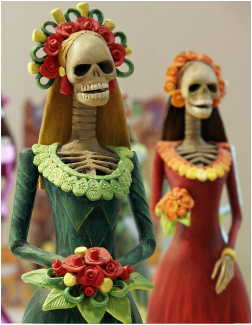Halloween and Day of the Dead
No, these two holidays are not the same. However, they have a few similarities and they occur near the same date. Halloween (October 31) and Day of the Dead (November 2) have very different origins and attitudes toward death. These holidays are not celebrated in every country in the world, and among those that do, the traditions and importance of the celebrations vary significantly.
These holidays date back thousands of years, and have changed dramatically through time. A curriculum unit based on either of these holidays will certainly be motivational for your students! The connections to the various content areas of the curriculum are abundant, and you can take your unit far beyond the content standards as you expand this excellent learning experience!
These holidays date back thousands of years, and have changed dramatically through time. A curriculum unit based on either of these holidays will certainly be motivational for your students! The connections to the various content areas of the curriculum are abundant, and you can take your unit far beyond the content standards as you expand this excellent learning experience!
Content standards learned through the investigations include history, geography, philosophy, religion, anthropology, all the language arts skills, media studies, communications, the arts (art, music, dance, drama, filmmaking), science, family and consumer sciences, economics, marketing, and math. Second language learning is certainly applicable.
Additionally students could develop critical 21st century skills and multiple literacies. This theme would be fun, interesting and meaningful for students when approached as a global, collaborative classrooms project. Through investigations of these traditions students could develop multicultural perspectives and global competencies.
Countries celebrating Halloween, Day of the Dead or similar holidays in their cultures include: Australia, Austria, Belgium, Brazil, Brittany, Canada, China, Columbia, Croatia, Czech Republic, Denmark, Ecuador, England, Finland, France, Germany, Guatemala, Haiti, Hong Kong, Hungary, India, Ireland, Isle of Man, Italy, Japan, Lebanon, Lithuania, Mexico, Nepal, the Netherlands, Norway, Philippines, Poland, Portugal, Romania, Saint Helena, Scotland, Slovakia, Slovenia, Spain, Sweden, Switzerland, Syria, Tyrol, the United States, Wales, West Bank/Gaza.
Additionally students could develop critical 21st century skills and multiple literacies. This theme would be fun, interesting and meaningful for students when approached as a global, collaborative classrooms project. Through investigations of these traditions students could develop multicultural perspectives and global competencies.
Countries celebrating Halloween, Day of the Dead or similar holidays in their cultures include: Australia, Austria, Belgium, Brazil, Brittany, Canada, China, Columbia, Croatia, Czech Republic, Denmark, Ecuador, England, Finland, France, Germany, Guatemala, Haiti, Hong Kong, Hungary, India, Ireland, Isle of Man, Italy, Japan, Lebanon, Lithuania, Mexico, Nepal, the Netherlands, Norway, Philippines, Poland, Portugal, Romania, Saint Helena, Scotland, Slovakia, Slovenia, Spain, Sweden, Switzerland, Syria, Tyrol, the United States, Wales, West Bank/Gaza.
Going above and beyond the Common Core - relevant, rigorous and real world curriculum that is project-based, interdisciplinary, 21st century, connected to the community (local to global) . . . see our 3 compass roses for designing a 21st century curriculum!
|
Curricular Connections
|
21st Century Skills
|
Click following links also:
|
|
Language Arts - from children's literature to Shakespeare, creative writing, research . . .
History Geography Economics Science - biology, chemistry, physics . . . Math Nutrition World Cultures and more! |
21st century skills
Global competencies Tech & Multimedia Social/Emotional Literacy Media Literacy Financial Literacy Ecoliteracy Service Learning Global Collaborative Classroom Projects |


